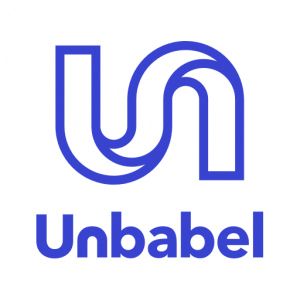Tell us about your role and journey into Marketing and Customer Service Technology. What inspired you to start Unbabel?
Five years ago, on a surfing trip, my co-founders and I discussed the AI dilemma, Technology had made this huge promise to solve machine translation but was still very far away from realizing that goal. The question we wanted to answer was, “What would the world look like if there were no language barriers?”
So, we started Unbabel with the vision of removing barriers to communication in customer service in any language by introducing a revolution in the way technology+humans collaborate in translation. Today, we have more than 100,000 human translators working in harmony with our Machine Learning algorithms to remove language barriers for some of the biggest and well-known customer and B2B brands in the world.
How does Unbabel fit into a modern Marketing Technology stack?
Part of any modern marketing stack is having your current customers create word of mouth recommendations to other customers. And in order for that to happen, customer service is an essential part of the relationship with that customer. Given how much and how fast word of mouth really spreads in today’s world with social networks and the ability of people to communicate so easily, investing in customer service is probably one of the best investments when it comes to increasing your brand and your marketing strategy.
Tell us about your recent services to Change.org and how it could impact social dynamic.
Change.org has over 375 million users globally and is the world’s biggest platform for social change. Like any service, Change.org gets ‘customer service’ requests, which can surround helping its users to make the most effective petitions possible. What isn’t widely known is that fewer than half of these requests are in English. Change.org has worked with Unbabel to leverage Machine Learning and human translators to deliver native-quality translations of customer support emails. Since then, it has not been met with a customer support request in any language that it couldn’t handle, even in dialect changes. It’s a great example of what removing language barriers can do for greater social good, and we’re really proud to be part of this.
What does your ideal customer profile like? Which industries are best suited to benefit from leveraging your services?
The current interest or industries where we’re seeing a lot of traction is travel, gaming and what we’re calling ‘big tech’. Typically, what we see in terms of ideal customer profile are digital companies that are actually already deployed on a global scale who want a high degree of operational flexibility in terms of how they serve customers in different markets. Regardless of the industry, it’s all about fast, accurate translations making for a smoother journey and a far better customer experience.
How can Marketing, Sales and Customer Service teams benefit from a Translation Engine? What are the core components of your technology driving the Translation Engine?
Unbabel blends human and Artificial Intelligence to create multilingual hubs in low-cost, language-agnostic locations capable of any-time support in 29 languages. This frees up customer service teams to focus on issues that really need their human ingenuity, rather than just tackling volume, and enables them to serve more people in more countries than ever before.
How does AI and Content Marketing Technology maximize the effectiveness of campaigns at each step of the user’s journey?
A big component of effective marketing is to provide relevant content at the right time for a particular person, and AI can really help in personalizing and recommending the right type of content in the different stages of a customer journey.
But more than that, if you think about languages, it’s another restriction and another variable to align. Even if you speak multiple languages, there are going to be certain topics that you are more likely to respond they’re in one language versus another — in a professional setting, you may be more comfortable interacting in English, for example. So, AI can help not only with content selection, but in our case, within Unbabel it can help with language as part of personalization.
How do you identify the biggest advantages and challenges in digital commerce? What role does Unbabel play in overcoming these challenges?
I think one of the biggest challenges in commerce is the customer service gap. If you’re born in a country where you don’t speak English, you often end up with inaccessible or poor-quality customer service. And for those who travel abroad for business for long periods of time, for example, if you’re trying to access customer service regarding something you’ve bought, you might just find that there isn’t any customer service available in your language.
Having access to high-level, adequate customer support should be a right for everyone that buys a product and a duty for any commercial entity. At Unbabel, we’re trying to make it a non-issue. We help companies support every customer in the world equally, not just those who speak a specific language.
Tell us about your go-to strategies to support rapid growth and the lessons learned through periods of massive shift and transition.
When growth and change needs to happen in an area that I might not have the most experience in, I think sometimes it’s useful to introduce agents of change. And a good opportunity to do that is by hiring people that have had the previous experience that is aligned to the change that you want to make happen. Someone that basically has already operated in the outcome, so to speak, can change things as you want to as it’s much easier for them to come in and naturally shift things to the way that they’re used to. When you have someone that has that level of experience, and the ability to lead that change, then that person can come in with fresh eyes and really drive an initiative.
Which Marketing and Sales Automation Tools and Technologies do you currently use?
Pardot, Salesforce and Drift are the main ones.
What are your predictions on the most impactful disruptions in AI and Content Curation technology for 2019-2020?
I think we are seeing a shift to an AI-first society when it comes to business. It’s not so much that the fundamental underlying technology will be disrupted, around content curation and the like. It’s really the continuing rollout of what we already have, but into pretty much every area. We’re seeing AI covered in cutting-edge areas of research, like medicine where AI is really having a huge impact. Soon, environments like financial departments will be able to go from a process where they’re fundamentally hiring MBAs to do data entry to having that talent actually do what they’re good at doing.
What startups in the technology industry are you watching keenly right now?
Monese is one that I’m keenly watching; a really exciting challenger banking platform that is helping people tackle the tricky issue of opening a bank account in a different country. Drift, as well — the conversational marketing platform.
Tell us about your outstanding Digital Marketing campaign. How did you measure its success?
We carried out a campaign to increase subscribers to our “customer-centric” newsletter. I would say this, but it has some amazing content in terms of topics, copy and illustration. We supported outreach with an optimized multichannel advertising campaign, and we were delighted to see a low cost per acquisition while maintaining high engagement — a real mark of success.
How do you prepare for an AI-centric world as a business leader?
I would say the number one priority is to develop a communication plan. Educate the people in your company about AI and use specific use cases that show benefits, whether that’s an increase in productivity or the time-saving in your day to day job. And then I think it’s it’s embracing the fact that new AI solutions are most likely going to come from people that have a different perspective in your business to those who are currently in leadership positions.
How do you inspire your people to work with technology?
I try to recruit and convince the best technology talent to join me, and then inspiring them is really about supporting them to do what they do best, giving them autonomy and agency to carry out great work.
One word that best describes how you work.
Lean.
What apps/software/tools can’t you live without?
WhatsApp! At this point, I would say 80% of my most important communication is done through WhatsApp.
What’s your smartest work-related shortcut or productivity hack?
Consuming information through audiobooks instead of books. It’s possible to train your ear and brain to process what you’re hearing at greater speeds, so you can even be setting the speed of a podcast or similar at 3x normal speed and saving a lot of time.
What are you currently reading?
So I’m right now reading “Stealing Fire” by Steven Kotler & Jamie Wheal, and the “Five Temptations of a CEO” by Patrick M Lencioni. And then I’m also flicking through “The Sports Gene” by David Epstein.
What’s the best advice you’ve ever received?
I doubt he had me in mind when he said it, but John Lennon said something which resonates with me to this day and advises a lot of the choices I make, “Life is what happens to you while you’re busy making other plans.”
Something you do better than others – the secret of your success?
I’m not really process-oriented, so it’s my intuition which I think has been a real differentiator in the past. Having that approach has meant (I hope) that the people throughout the company feel they can have really honest conversations with me – which is so important.
Tag the one person (or more) in the industry whose answers to these questions you would love to read:
There are just so many — let’s go really big and say Jeff Bezos.
Vasco Pedro is CEO and Co-Founder of San Francisco-based 2014 Y Combinator graduate and scaleup Unbabel, a leading enterprise SaaS translation company that combines state-of-the-art Artificial Intelligence with a global crowd of 100,000+ human translators to break down business communication barriers in customer service. Unbabel is helping companies such as Microsoft, easyJet, Booking.com and Rovio “understand and be understood” by their customers.

Unbabel’s Customer Service Solution allows modern enterprises to understand and be understood by their customers in dozens of languages.
Powered by state-of-the-art AI and refined by a global crowd of thousands, Unbabel helps global brands such as Booking.com, Facebook, Skyscanner, easyJet, Under Armour and Rovio remove language as a concern, increasing customer satisfaction and building a more efficient customer service operation in the process.
Backed by Scale Venture Partners, Notion, Microsoft Ventures, Salesforce Ventures, Samsung NEXT and Y Combinator, Unbabel is accelerating the shift to a world without language barriers.
The MTS Martech Interview Series is a fun Q&A style chat which we really enjoy doing with martech leaders. With inspiration from Lifehacker’s How I work interviews, the MarTech Series Interviews follows a two part format On Marketing Technology, and This Is How I Work. The format was chosen because when we decided to start an interview series with the biggest and brightest minds in martech – we wanted to get insight into two areas … one – their ideas on marketing tech and two – insights into the philosophy and methods that make these leaders tick.











